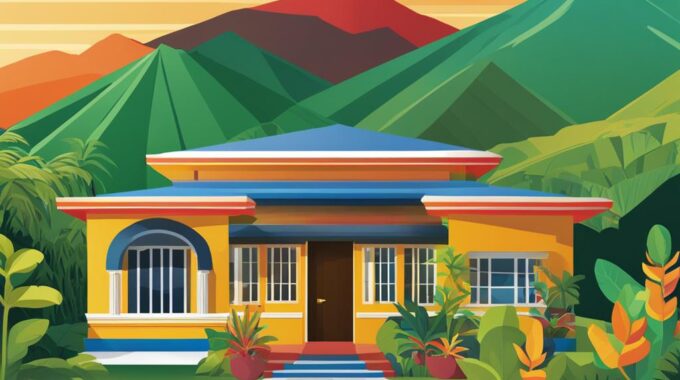Access home equity loans in Costa Rica 2025 with competitive rates and flexible terms. Use your property as collateral for $50k to $1M loans. Apply now!

Unlocking Home Equity Loan Education in Costa Rica
Home equity loans in Costa Rica provide a mechanism for property owners to leverage the value accumulated in their properties. They serve various financial purposes, such as debt consolidation, home renovation, or business funding. With typical interest rates ranging from 12% to 16% and terms spanning 6 months to 3 years, these loans offer a route to access funds by using property as collateral. Costa Rica’s thriving tourism industry and attractive landscapes contribute to the popularity of home equity loans for property investments, benefiting from lower interest rates when compared to unsecured financing options.
Key Takeaways
- Home equity loans in Costa Rica allow property owners to access funds for various financial purposes, using their property as collateral.
- Typical interest rates range between 12% and 16%, and loan terms can last from 6 months to 3 years.
- Lower interest rates make home equity loans more attractive than unsecured financing options.
- Property values and equity amount play a crucial role in determining loan viability.
- Home equity loan education in Costa Rica helps homeowners access financing and make informed choices.
The Basic Principles of Home Equity Loans in Costa Rica
Home equity loans, also referred to as second mortgages, provide a powerful financial tool for Costa Rican property owners to borrow against their property’s value. Understanding the basic principles of this type of funding enables them to make informed decisions and adhere to the best practices for successful borrowing. This section will guide you through topics such as home equity loan education Costa Rica, educational resources for home equity loans in Costa Rica, and equity loan education in Costa Rica.
First and foremost, let’s discuss the essential components of a home equity loan in Costa Rica:
- Property appraised value
- Equity amount
- Lender-specific loan-to-value ratio (LTV) requirements
The basic principle behind a home equity loan lies in the utilization of equity—the difference between the current market value of the property and the outstanding mortgage balance—as collateral. Homeowners gain access to substantial cash by leveraging their property’s value, which can be used for various purposes, such as debt consolidation, home improvement projects, or business funding.
One of the key advantages of home equity loans in Costa Rica is their typically lower interest rates compared to unsecured financial options like personal loans or credit cards. Let’s explore further:
Home equity loans in Costa Rica tend to have lower interest rates than traditional financing options due to the additional security provided by the property serving as collateral. Consequently, borrowers benefit from more attractive loan terms and the potential to save money on interest costs over time.
The viability of home equity loans depends on several factors, hinging primarily on the property’s appraised value, the amount of equity built up, and the lender’s specific LTV requirements. It is essential to understand the potential loan amounts and interest rates before proceeding with this type of financing.
To better grasp these determinants, consider the following examples:
| Scenario | Property Value | Outstanding Mortgage | Equity | LTV Ratio | Potential Loan Amount |
|---|---|---|---|---|---|
| 1 | $200,000 | $100,000 | $100,000 | 50% | $50,000 |
| 2 | $400,000 | $200,000 | $200,000 | 50% | $100,000 |
| 3 | $600,000 | $300,000 | $300,000 | 50% | $150,000 |
Ultimately, thorough research and due diligence are crucial to understanding the nuances of home equity loans in Costa Rica. By leveraging educational resources and seeking advice from knowledgeable professionals, homeowners can navigate the intricacies of equity loan education in Costa Rica and make well-informed decisions that cater to their unique financial circumstances.
Finding the Right Lender for Your Costa Rica Home Equity Loan

Finding a reputable lender for your Costa Rica home equity loan is crucial to ensure you receive competitive interest rates and flexible loan terms. A top lending option in the Costa Rican market is GAP Equity Loans Costa Rica, known for its customer support and streamlined application process.
GAP Equity Loans: A Market Leader in Home Equity Lending
With competitive interest rates between 12% and 16%, flexible terms ranging from 6 months to 3 years, and the ability to borrow against up to 50% loan-to-value (LTV) of a property’s assessed value, GAP Equity Loans is a popular choice for homeowners looking to leverage their property’s equity.
Navigating Interest Rates and Loan Terms with Expertise
When seeking a loan, borrowers must carefully evaluate interest rates and loan terms in Costa Rica, as they will directly impact the overall cost of the loan. Interest rates for Costa Rica home equity loans are determined by factors such as creditworthiness, property value, and lending policies, with average rates between 12% and 16%. Loan terms also play a significant role, as longer terms usually result in higher interest costs. It’s essential to consider these factors and select a loan that aligns with your financial objectives.
By choosing a lender like GAP Equity Loans, borrowers gain access to competitive interest rates, flexible terms, and attentive customer service to ensure a seamless borrowing experience.
What You Need to Know Before Applying
Before applying for a Costa Rica home equity loan, homeowners must be prepared with necessary documentation and ensure they meet lender requirements. Key factors to consider include:
- Substantial equity in the property
- Satisfactory credit history
- Verifiable income
- Up-to-date legal documentation such as property tax receipts and deeds
The property’s market value, appraised by the lender, will also affect the loan amount, LTV ratio, and interest rates. This makes selecting a trusted lender, like GAP Equity Loans, even more critical. Lastly, transparency regarding fees—including closing costs and appraisal fees—is crucial for understanding the loan’s total expense.
With comprehensive home equity loan guides for Costa Rica at your disposal, properly preparing yourself will make the loan application process smoother and increase your chances of securing a suitable loan for your financial needs.
The Advantages of Using Home Equity Loans for Costa Rica Properties
Choosing the right Costa Rica property financing options is instrumental in successfully managing your finances. One such option is harnessing the advantages of home equity loans Costa Rica property owners have been benefiting from. These loans offer several perks that set them apart from other financing alternatives.
- Lower Interest Rates: Generally, home equity loans have lower interest rates compared to unsecured loans or credit cards, reducing the overall borrowing cost.
- Potential Tax Benefits: Interest payments on home equity loans can be tax-deductible in some cases, leading to potential savings on annual tax expenses.
- Flexibility in Borrowing Amounts: Lenders allow borrowers to access up to 50% of their property’s loan-to-value ratio (LTV), enabling access to significant capital based on property values.

Home equity loans can be beneficial in several situations, including financing home improvements and consolidating high-interest debts. By doing so, property owners can add value to their property and enhance its market value, resulting in long-term financial gains.
Home equity loans provide lower interest rates, potential tax benefits, and flexible borrowing amounts, making them an ideal financing solution for various needs and investments in Costa Rican property.
In summary, considering the advantages of home equity loans Costa Rica offers, it is evident that they are a valuable tool for property financing. These loans serve as a cost-effective and flexible method for leveraging the potential of Costa Rican real estate, paving the way for property owners to achieve their financial goals.
Conclusion
Home equity loans offer a compelling financial solution for property owners in Costa Rica, allowing them to capitalize on lower interest rates and substantial fund accessibility. Opting for reputable lenders like GAP Equity Loans ensures that borrowers benefit from expertise and a customer-first approach. Given the variety of financing options available, such as traditional mortgages and development loans, home equity loans remain the popular choice due to their cost-effectiveness and flexibility.
Proper preparation and understanding of terms are vital for successful borrowing. As opportunities in the Costa Rican property market continue to rise, homeowners can take advantage of supportive financing tools like home equity loans to achieve their financial goals. Whether for Home equity loan education Costa Rica, debt consolidation loans, or financing property improvements, these loans provide a convenient means of leveraging the value of one’s property.
In summary, Costa Rican property owners seeking a powerful financial tool should consider exploring home equity loans for their various needs. By carefully selecting a lender, staying informed about interest rates, loan terms, and eligibility requirements, borrowers can maximize their property’s value and achieve their financial goals in this burgeoning market.
FAQ
What are the basic principles of home equity loans in Costa Rica?
Home equity loans in Costa Rica allow homeowners to borrow against their property’s value, using the equity as collateral. Equity is determined by subtracting the outstanding mortgage balance from the property’s market value. These loans typically have lower interest rates than unsecured financial options like personal loans or credit cards.
Who are the leading providers of home equity loans in Costa Rica?
GAP Equity Loans is a recognized market leader in home equity lending in Costa Rica, offering competitive interest rates, flexible terms, and personalized service for borrowers interested in leveraging their property’s value for various financial purposes.
How are interest rates and loan terms determined for home equity loans in Costa Rica?
Interest rates for home equity loans in Costa Rica are influenced by creditworthiness, property value, and lender policies, with average rates ranging from 12% to 16%. Loan terms typically span between 6 months to 3 years, offering flexibility in repayment scheduling. Borrowers should carefully consider both interest rates and term durations in relation to their financial plans.
What are the requirements before applying for a home equity loan in Costa Rica?
To apply for a home equity loan in Costa Rica, homeowners must have substantial equity in their property, satisfactory credit history, and verifiable income. Additionally, all relevant legal documentation, including property tax receipts and deeds, should be current. Transparency regarding fees like closing costs and appraisal fees is also crucial for a complete understanding of the loan’s cost.
What are the benefits of using home equity loans for financing in Costa Rica?
Advantages of using home equity loans in Costa Rica include lower interest rates compared to alternative financing options, potential tax benefits linked to interest payments, and flexible borrowing amounts up to 50% LTV based on property values. These loans can fund various endeavors such as property improvements or consolidation of higher-interest debts, adding value to the underlying asset.
Article by Glenn Tellier (Founder of CRIE and Grupo Gap)



